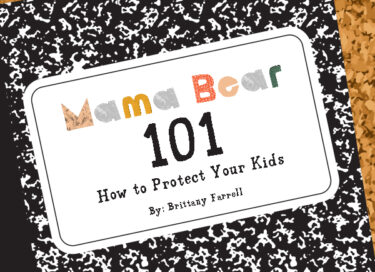
Parents are becoming increasingly aware of the myriad of overt and subtle ways individuals and organizations today attempt to sever the parent-child connection. From the library to the pediatrician’s office, the soccer team to the classroom, the odds seem to be stacked against parents who wish to be present, informed, involved, and in control of their children’s upbringing. That does not mean, however, that it is impossible for parents to confidently take the lead when it comes to their children’s lives.
As a mother of several children from toddler to middle school ages, I am acutely aware of the dangers and temptations lying in wait for our children. Because of that, I operate in a heightened state of alert with regards to most of my children’s interactions and activities. Like many moms, I watch. I listen. I notice. Not because I necessarily expect something bad to be lurking around every corner, but because I know that there really is no way to know when something will happen or when someone or something will try to take even the smallest step between me and my children. Here are some guidelines for ways to be prepared and proactive in protecting and asserting your fundamental parental rights, whether you are engaging with doctors, schools, sports, camps, church activities or friends.
Know the priorities and values of both the organization and of the individuals involved. Know who is in charge and who will be around your child. Know the policy on adult-child interactions. Ask about their perspective and policies on parental involvement. Talk to other parents who have engaged with the organization, school, practice, or person to get honest feedback. Communicate constantly with other parents about their experiences.
Find out everything you can about your school’s curriculum, particularly history, literature, science, health, and bullying.
Both the previous article from Will Estrada, as well as the NC Institute for Constitutional Law’s recent document “Parents’ Constitutional Right to Parent Without Government Interference,” are helpful starting places for understanding your rights as a parent. The Supreme Court has referred to parental rights as “perhaps the oldest of the fundamental liberty interests” in the United States. The Fourteenth Amendment of the U.S. Constitution ensures that parents get to decide how their children should be raised.
Never leave your child alone with an unknown adult. Be present in the room for all physicals, sick visits, dental appointments, eye appointments, etc., even and perhaps especially if the professional would prefer you to leave. Do not sign anything that in any way limits your access, rights, or authority over your child or decisions regarding their care. This is especially important in hospital and emergency settings.
Keep your children home on days the school plans to present or discuss sensitive or inappropriate content. You are your child’s first and primary educator. You get to make the decision about when and how your child will be exposed to sensitive topics.
Get to know the staff, including the receptionist, principal, individual teachers, substitutes, doctors, nurses, coaches, counselors. Communicate appropriately, volunteer and assist whenever possible, attend events with staff and families to build relationships within the community. Have honest and frequent conversations with them about your goals, priorities and values. That way, if something is off, you will likely know before it is too late. Look at the posters on walls and books on shelves. Listen to what is on the radio and screens.
Unlike past generations, we are not raising children in an “osmosis culture,” where they will see, hear, and experience basically the same Judeo-Christian values and priorities in nearly all their life interactions and experiences. However, that doesn’t mean it is impossible to surround our young, innocent, impressionable children with a village that will work together to model, teach, and demand our shared values.
Build your village! Be very discerning of friend groups, for your family and children. Prioritize friendships with people who share your priorities and life goals. Befriend both parents who have already been through the stages of life you are in or approaching AND parents who are currently navigating the same phases, so that you can learn from their wisdom and also work together to keep each other aware and accountable. You cannot be everywhere, see everything, hear everything, so you need trusted eyes and ears all around.
Make sure your child knows the true fact that they were wonderfully made by the Almighty Creator just the way they are for a specific purpose, and they are perfectly loved by Him and by you. God does not make mistakes. Give them confidence in their identity as a son or daughter of the King of Heaven and earth.
Have honest and age-appropriate conversations with your children. Maintain your child’s innocence while instilling in them a knowledge of and love for truth. Encourage them to be pursuers of truth in all things at all times. The greatest antidote to lies is the truth.
Especially with schools and doctors, continue to have honest and frequent conversations about your goals, priorities, and values to be sure that they are aligned. Don’t be too afraid to change schools or homeschool, to change doctors, to walk out of a doctor’s office or hospital. Listen to your gut.
My own mother has always said, “God gives you the children He needs you to raise.” He did not give your children to anyone else, not a relative, not a doctor or a teacher, and certainly not to the government. God gave YOU His children. To be in YOUR care. To be raised and taught and cared for by YOU. That is an awesome and eternal responsibility. We cannot take it too seriously. We cannot be too vigilant or too focused on the task at hand.
Download ENTIRE ARTICLE (with images and footnotes)
Brittany Farrell is a North Carolina mother of 4 who formerly served as NC Family’s Assistant Director of Policy.